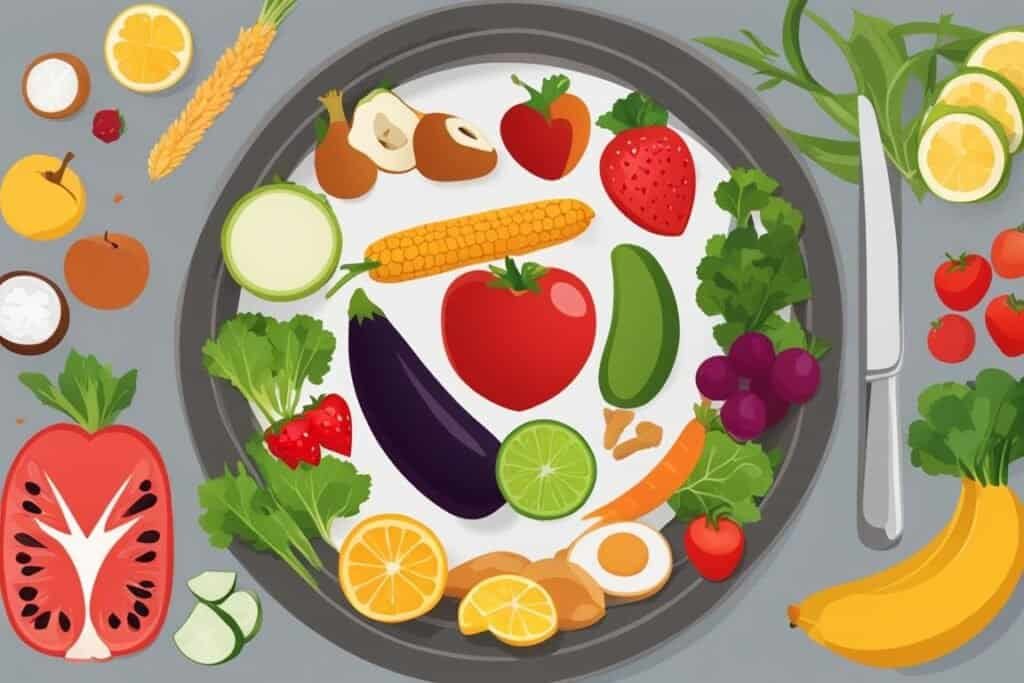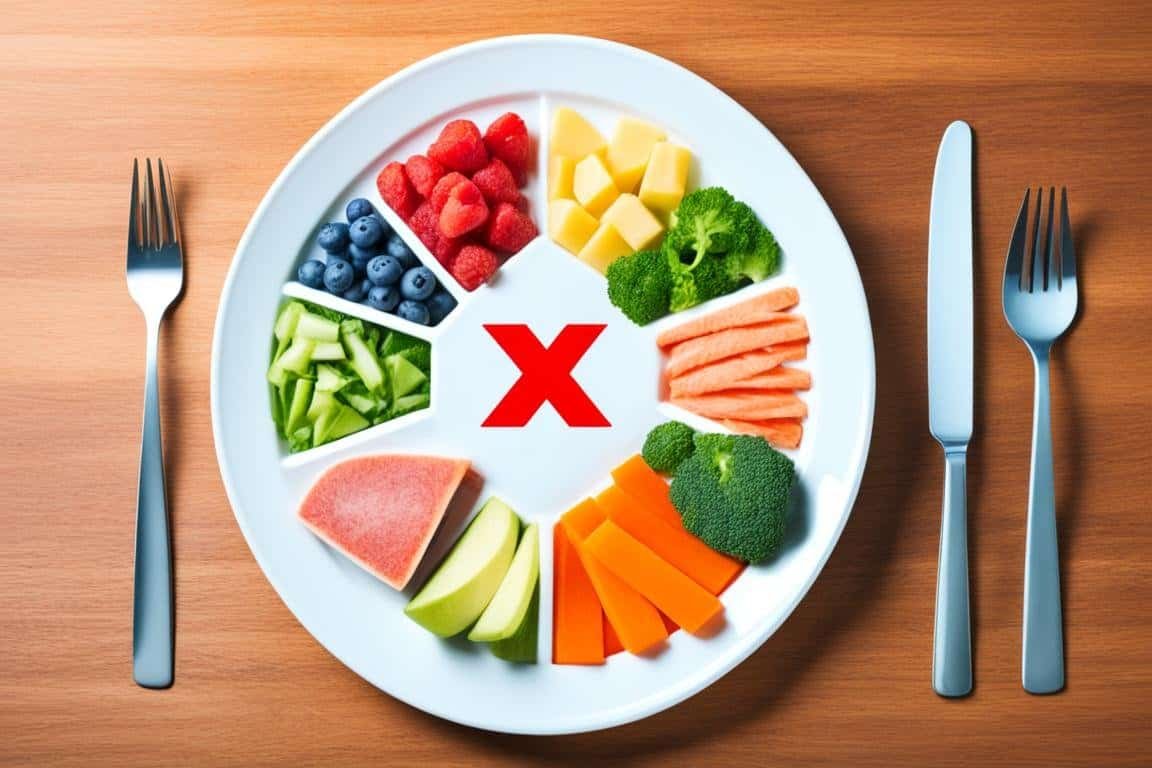After experiencing a heart attack, it is crucial to make changes to your diet to promote heart health and reduce the risk of another cardiac event. Your diet plays a significant role in your recovery and overall well-being. By managing your diet after a heart attack, you can support your body’s healing process and improve your long-term prognosis.
In this article, we will provide you with valuable information on limiting specific foods after a heart attack and adopting a heart-healthy diet for better recovery. By understanding the food restrictions after a cardiac event and implementing cardiac diet guidelines, you can effectively manage your diet and make informed choices for healthy eating post-heart attack.
Key Takeaways:
- After a heart attack, it is important to make dietary changes to promote heart health and reduce the risk of another cardiac event.
- Limiting specific foods after a heart attack and adopting a heart-healthy diet can support your recovery and improve your long-term prognosis.
- Following cardiac diet guidelines and managing your diet effectively can help you make informed choices for healthy eating post-heart attack.
- Consulting with healthcare professionals can provide individualized guidance and support in managing your diet and lifestyle after a heart attack.
- Taking steps to improve your heart health, such as adopting a heart-healthy eating plan, can significantly reduce the risk of future cardiac events.
Best Foods for a Heart-Healthy Diet
A heart-healthy diet plays a crucial role in promoting heart health and reducing the risk of cardiovascular diseases. By prioritizing whole foods that are low in saturated fat, sodium, and added sugars, you can nourish your heart and maintain optimal well-being.
Here are some of the best foods to include in a heart-healthy diet:
- Fruits and Vegetables: Incorporate a colorful variety of fruits and vegetables into your meals. These nutrient-rich foods are packed with vitamins, minerals, and antioxidants that support heart health. Aim for at least five servings per day.
- Nuts and Seeds: Walnuts, almonds, chia seeds, and flaxseeds are excellent sources of heart-healthy fats, fiber, and omega-3 fatty acids. Enjoy them as snacks, sprinkle them on salads, or add them to smoothies.
- Beans and Legumes: Lentils, chickpeas, black beans, and kidney beans are high in fiber and protein while being low in saturated fat. They provide essential nutrients and are versatile additions to soups, salads, and main dishes.
- Fish and Seafood: Fatty fish like salmon, mackerel, and trout are rich in omega-3 fatty acids, which have been shown to reduce the risk of heart disease. Aim to include fish in your diet at least twice a week.
- Whole Grains: Opt for whole grains like oats, brown rice, quinoa, and whole wheat bread. These grains are high in fiber and can help lower cholesterol levels. Make them a staple in your meals.
- Lean Meats: Choose lean cuts of meat like skinless poultry, turkey, and lean cuts of beef and pork. Trim visible fat before cooking to reduce saturated fat intake.
- Plant-Based Oils: Olive oil, avocado oil, and canola oil are heart-healthy options to replace saturated and trans fats in cooking and dressings. These oils contain monounsaturated fats that support heart health.
By incorporating these heart-healthy foods into your daily diet, you can nourish your heart, reduce the risk of cardiovascular diseases, and promote overall well-being.
| Heart-Healthy Foods | Benefits |
|---|---|
| Fruits and Vegetables | Rich in vitamins, minerals, and antioxidants that support heart health. |
| Nuts and Seeds | Provide heart-healthy fats, fiber, and omega-3 fatty acids. |
| Beans and Legumes | High in fiber and protein, low in saturated fat. |
| Fish and Seafood | Rich in omega-3 fatty acids that reduce the risk of heart disease. |
| Whole Grains | High in fiber, help lower cholesterol levels. |
| Lean Meats | Choose lean cuts to reduce saturated fat intake. |
| Plant-Based Oils | Replace saturated and trans fats with heart-healthy monounsaturated fats. |
Recommended Diet Types for Heart Health
When it comes to promoting heart health and reducing the risk of another cardiac event, following a heart-healthy diet is crucial. There are several recommended diet types that have shown positive effects on heart health, including the Mediterranean diet, the DASH diet, and plant-based eating.
The Mediterranean Diet
The Mediterranean diet is often hailed as one of the best diets for heart health. It is rich in heart-healthy fats, such as olive oil and nuts, while emphasizing the consumption of legumes, fish, and plenty of fresh fruits and vegetables. By following this diet, you can enjoy a wide variety of flavorful foods while protecting your heart.
The DASH Diet
The DASH (Dietary Approaches to Stop Hypertension) diet focuses on reducing sodium intake and emphasizes the consumption of plant-based foods, lean meats, and low-fat dairy products. This diet has been proven to lower blood pressure and improve heart health. By following the DASH diet, you can nourish your body with nutrient-rich foods and support your heart’s well-being.
Plant-Based Eating
Plant-based eating involves consuming predominantly fruits, vegetables, grains, and legumes, while minimizing the consumption of meat and animal products. By adopting a plant-based eating pattern, you can reduce the intake of saturated fats and cholesterol, which are harmful to the heart. This diet is not only beneficial for heart health but also for overall well-being.
Switching to heart-healthy diets like the Mediterranean diet, the DASH diet, or adopting plant-based eating can significantly improve heart health and reduce the risk of heart attack recurrence. Remember to consult with a healthcare professional for personalized dietary recommendations post-heart attack.

| Diet Type | Main Characteristics |
|---|---|
| Mediterranean Diet | Rich in heart-healthy fats, legumes, fish, fruits, and vegetables |
| DASH Diet | Focuses on plant-based foods, lean meats, and low-sodium intake |
| Plant-Based Eating | Primarily consists of fruits, vegetables, grains, and legumes, with minimal meat consumption |
Foods to Avoid after a Heart Attack
After experiencing a heart attack, it is crucial to make dietary changes that support heart health and aid in recovery. Avoiding certain foods can significantly reduce the risk of another cardiac event and promote overall well-being.
Here are some foods to avoid after a heart attack:
- Unhealthy Fats: Limit your intake of saturated fats and trans fats found in fatty meats, full-fat dairy products, butter, and fried foods. These fats can increase cholesterol levels and clog your arteries.
- High-Sugar Foods: Cut back on foods and drinks high in added sugars, such as sugary beverages, candies, cookies, cakes, and pastries. Excess sugar intake can contribute to weight gain and increase the risk of diabetes and heart disease.
- Processed Foods: Minimize consumption of processed foods, including packaged snacks, frozen meals, and fast food. These foods often contain high levels of sodium, unhealthy fats, and artificial additives that can negatively affect your heart health.
- Excessive Sodium Intake: Reduce your sodium intake by limiting processed meats, canned soups, pickles, and other foods with high salt content. High sodium intake can elevate blood pressure and strain your heart.
- Alcohol: Moderate or avoid alcohol as excessive drinking can contribute to high blood pressure, irregular heart rhythms, and weakened heart muscle.
By avoiding these foods and making healthier choices, you can support your heart health and improve your overall well-being. It is essential to seek guidance from a healthcare professional or registered dietitian to develop a personalized post-heart attack diet plan.
The Role of Supplements in Post-Heart Attack Nutrition
Supplements can play a vital role in your post-heart attack nutrition, particularly if there are vitamin deficiencies that need to be addressed. Individuals following a vegetarian or vegan diet may require supplementation for essential nutrients such as vitamin B12 and iron. Vitamin D deficiency is also common, especially among certain populations.
Supplements can provide an additional source of these crucial nutrients, helping to optimize your recovery and support your heart health. However, it is important to consult with a doctor before starting any supplements. They can assess your specific needs, take into account your current medications, and determine if supplementation is necessary. Additionally, a nutrient-rich diet should always be the foundation of your post-heart attack nutrition plan.

When considering supplements, it is crucial to prioritize safety and effectiveness. Consult a healthcare professional, such as a cardiologist or a registered dietitian, who can guide you in choosing the right supplements and provide personalized recommendations based on your unique needs and medical history.
Here are some key points to keep in mind when it comes to supplements after a heart attack:
- Consult your doctor: Before starting any supplements, consult with your doctor or a healthcare professional to evaluate your specific nutrient needs and ensure compatibility with your medications.
- Address vitamin deficiencies: If you have identified specific vitamin deficiencies through blood tests, your doctor may recommend targeted supplementation to address those deficiencies.
- Consider lifestyle factors: Vegetarians, vegans, and individuals with limited sun exposure should pay attention to potential deficiencies and discuss appropriate supplementation options with their healthcare provider.
- Choose high-quality brands: Look for reputable brands that adhere to strict quality standards, such as third-party testing for purity and potency.
- Follow recommended dosages: It’s important to follow the recommended dosages as prescribed by your healthcare professional. Taking excessive amounts of certain supplements can be harmful.
Please note that supplements should never replace a balanced and nutrient-rich diet. They should be used as a complement to a healthy lifestyle and not as a substitute for a varied diet that includes a wide range of whole foods.
Remember, your healthcare team is the best resource to guide you through your post-heart attack nutrition journey, helping you make informed decisions about supplementation. Together, you can develop a comprehensive plan that promotes your recovery and safeguards your heart health.
Other Heart-Healthy Lifestyle Habits
In addition to adopting a heart-healthy diet, there are several other lifestyle habits that can promote heart health and enhance your overall well-being. Incorporating these habits into your daily routine can significantly reduce the risk of heart disease and improve your cardiovascular health.
Regular Exercise
Exercise plays a crucial role in maintaining a healthy heart. Engaging in regular physical activity can help strengthen your heart muscle, lower blood pressure, improve cholesterol levels, and manage weight. Aim for at least 150 minutes of moderate-intensity aerobic exercise or 75 minutes of vigorous-intensity exercise every week. Walking, swimming, cycling, and dancing are excellent options for cardiovascular workouts.
Maintaining a Healthy Weight
Being overweight or obese puts extra strain on your heart and increases the risk of cardiovascular diseases. By maintaining a healthy weight, you can reduce the pressure on your heart and lower the chances of developing heart-related complications. A combination of a balanced diet and regular exercise can help achieve and maintain a healthy weight.
Stress Management
Chronic stress can have a negative impact on your heart health. Find healthy ways to manage stress, such as practicing relaxation techniques like deep breathing exercises, meditation, and yoga. Engaging in activities that you enjoy, socializing with loved ones, and pursuing hobbies can also help reduce stress levels.
Quitting Smoking
Smoking is a major risk factor for heart disease. It damages the blood vessels, reduces oxygen supply to the heart, and increases the risk of blood clots. Quitting smoking is one of the best things you can do for your heart health. Seek support from healthcare professionals, join smoking cessation programs, and consider using nicotine replacement therapy if needed.
Limiting Alcohol Consumption
While moderate alcohol consumption may have some health benefits, excessive drinking can have detrimental effects on your heart. High alcohol intake can raise blood pressure, contribute to weight gain, and increase the risk of cardiovascular diseases. Limit your alcohol consumption to moderate levels – one drink per day for women and up to two drinks per day for men.
Mental Health Support
Mental health plays a crucial role in overall well-being and heart health. Seek out support if you are experiencing mental health challenges such as anxiety, depression, or chronic stress. Reach out to a mental health professional who can provide guidance, therapy, or appropriate interventions to help you manage your mental well-being and its impact on your heart health.
By incorporating these heart-healthy lifestyle habits into your daily routine, you can significantly reduce the risk of heart disease and improve your overall quality of life. Remember, small changes can make a big difference when it comes to your heart health.
Conclusion
Adopting a heart-healthy diet and making lifestyle changes can play a crucial role in preventing another heart attack and promoting overall heart health. By limiting specific foods that are high in unhealthy fats, sodium, and added sugars, you can reduce the risk of future cardiac events. Following a heart-healthy eating plan, which includes fruits and vegetables, whole grains, lean meats, and plant-based oils, provides essential nutrients for your heart.
In addition to diet, incorporating other heart-healthy habits is important. Regular exercise helps strengthen your heart and improve circulation. Maintaining a healthy weight reduces the strain on your heart and lowers your risk of cardiovascular diseases. Managing stress through relaxation techniques and seeking support if needed contributes to heart health. Quitting smoking and limiting alcohol consumption also have a positive impact on your heart.
To ensure a personalized approach, it is crucial to consult with healthcare professionals who can provide individualized guidance and support in managing your diet and lifestyle after a heart attack. They can help you create a diet plan that addresses your specific needs and preferences. By embracing a heart-healthy lifestyle, you can significantly improve your quality of life and reduce the likelihood of future heart-related complications.

